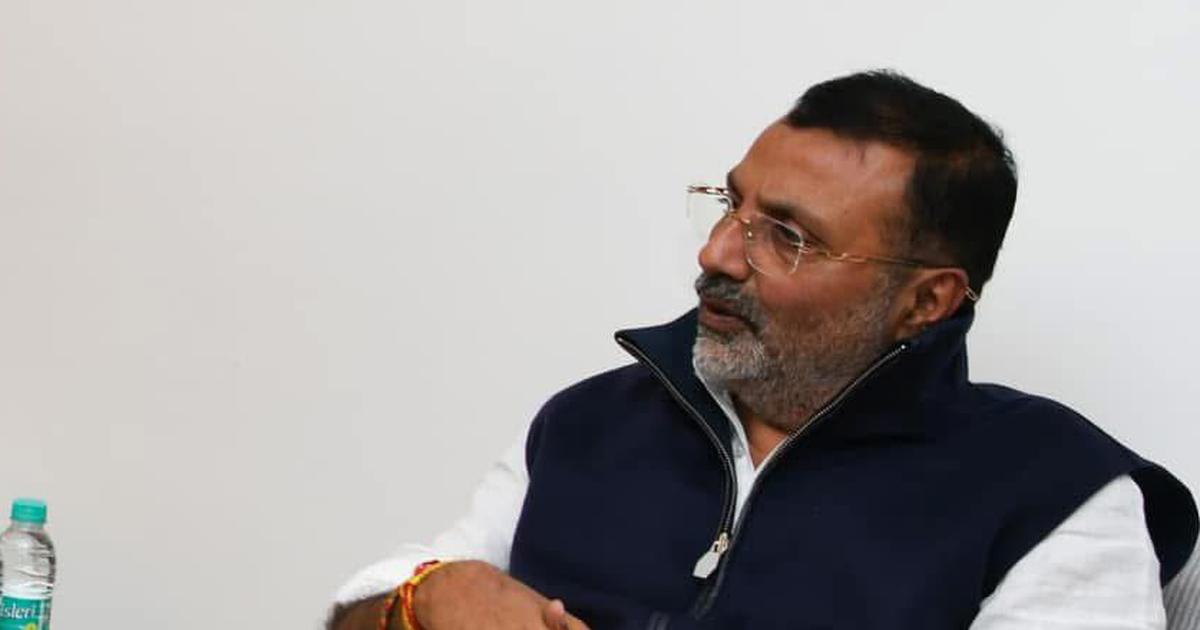Supreme Court ‘responsible for inciting religious wars’: BJP’s Nishikant Dubey
Dubey’s comment was in reference to several judgements of the court including its April 8 verdict setting a timeline for the president to decide on bills.

Bharatiya Janata Party MP Nishikant Dubey on Saturday said that the Supreme Court was responsible for “inciting religious wars” in the country, ANI reported.
“The Supreme Court is going beyond its limits…” Dubey was quoted as saying. “If one has to go to the Supreme Court for everything, then Parliament and state Assembly should be shut...”
Dubey cited the court’s decisions to decriminalise homosexuality in 2018 and the striking down of section 66(a) of the Information Technology Act in 2021.
The MP from Jharkhand’s Godda claimed that the court had decriminalised homosexuality despite “all [religious] communities considering it wrong”. He also referred to the Donald Trump administration in the United States passing an executive order in January, in which it said that only two sexes will be recognised.
“The Trump administration has said that there are only two sexes in the world – male or female,” Dubey said. “They did not speak about transgender people, or about homosexuality.”
While the BJP leader appeared to suggest that the Trump administration does not recognise homosexuality, same-sex sexual activity is legal in all 50 states in the US.
The Godda MP also claimed that section 66(a) of the IT Act was necessary to stop the misuse of online platforms to share objectionable content.
Dubey said: “When the issue of the Ram temple comes up, you [the Supreme Court] say ‘show documents’; when the issue of Krishna Janmabhoomi comes up in Mathura, you will say ‘show documents’; when it comes to the Gyanvapi mosque, you will again say ‘show documents’.”
“But when it comes to the mosques built after the arrival of the Mughals, you say there are no documents to show,” he added.
Dubey made the remark while answering a reporter’s question about his social media post on Saturday morning in which the BJP MP said that Parliament “should be closed if the Supreme Court makes the law”.
The BJP MP’s remarks came amid the Supreme Court hearing the challenges to the recently-passed Waqf Amendment Act.
On Thursday, the Union government told the Supreme Court that some provisions of the contentious Waqf Amendment Act, such as the denotification of existing waqf properties, will not be enacted until the court hears the matter again.
This came a day after the court proposed to stay some of the amended Act’s provisions, including the inclusion of non-Muslims in waqf boards and the denotification of properties declared as waqf by courts.
#WATCH | Delhi: "...Supreme Court is responsible for inciting religious wars in the country. The Supreme Court is going beyond its limits. If one has to go to the Supreme Court for everything, then Parliament and State Assembly should be shut..." says BJP MP Nishikant Dubey pic.twitter.com/ObnVcpDYQf
— ANI (@ANI) April 19, 2025
On Saturday, Dubey also questioned how the Supreme Court could issue directives to its appointing authority. “The president appoints the chief justice of India,” he said.
The comment was in reference to the Supreme Court’s April 8 judgement imposing a three-month deadline for the president to approve or reject bills referred by state governors.
“Parliament makes the law of this country,” Dubey said. “You will dictate that Parliament?...How did you make a new law? In which law is it written that the president has to take a decision within three months?”
The BJP MP added: “This means that you want to take this country towards anarchy. When Parliament sits, there will be a detailed discussion on this...”
#WATCH | BJP MP Nishikant Dubey says, "How can you give direction to the appointing authority? The President appoints the Chief Justice of India. The Parliament makes the law of this country. You will dictate that Parliament?... How did you make a new law? In which law is it… https://t.co/CjTk4wBzHA pic.twitter.com/HYNa8sxBVt
— ANI (@ANI) April 19, 2025
Dubey’s comments about the Supreme Court’s bill assent ruling came two days after Vice President Jagdeep Dhankhar said that there cannot be a situation where the judiciary issues directives to the president.
“So we have judges who will legislate, who will perform executive functions, who will act as super Parliament, and absolutely have no accountability because the law of the land does not apply to them,” Dhankhar had said at an event.
The Supreme Court’s verdict on April 8 came on a petition filed by the Tamil Nadu government after Governor RN Ravi did not act on several bills for over three years before rejecting them and sending some to the president.
Most of the bills related to higher education, including measures to remove the governor as chancellor of state universities. Of the 10 re-enacted bills sent to the president in November 2023, one was approved, seven were rejected and two were pending.
The court held that Ravi’s decision to withhold assent to 10 bills, some of which were pending since January 2020, and refer them to the president after they were re-enacted by the Assembly was “illegal and erroneous”.
The court declared that the 10 bills would be deemed to have received the governor’s assent from the date they were passed a second time by the legislature. It also set aside any action taken by the president based on the governor’s reference.
In its 414-page judgement, the court also imposed a three-month deadline on the president to approve or reject such bills.
Also read: Explained: How a landmark Supreme Court judgement has ended the governor’s ‘pocket veto’









